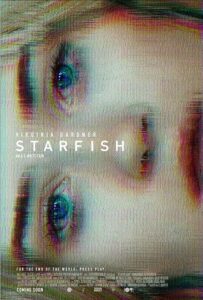A. T. White’s fascinating debut feature isn’t exactly hard science fiction, but there’s certainly a logic to it.


Combining elements of “Being John Malkovich” with “Eternal Sunshine of the Spotless Mind” along with the nebulous questions posed in “Annihilation,” the odd and sometimes alluring “Starfish” is worth investing in. The slow boiling story builds and builds as Aubrey (Virginia Gardner) attends the funeral of a friend, only to discover that some kind of rift in space and time has occurred and life, as we know it, has become warped. After leaving the funeral in a rush, Aubrey holes up in her deceased friend’s apartment, where she finds a number of mixtapes that may hold the key to saving the human race.

“Starfish” is one strange retro ride. While the analogue mystery has something to do with sound, or a combination of sounds, and a monster stalks the streets outside the apartment, there’s always a sense that what we are seeing might all be playing out in Aubrey’s head. The screenplay, from director White, presents an unreliable protagonist, who, at one point, even breaks the fourth wall. Repeat viewings for some will be in order.
The special effects, crafted on a budget, are impressive. The monsters are strange, scary, and beautifully constructed. And the score, also by White, pushes the disjointed narrative forward in a thoroughly disarming way. This one will be compared to “Primer,” but it is much less grounded, as White is determined to keep us guessing and throw anything concrete out the window.

Gardner is very good here. For almost the entire film, she is the only human character. And an animated sequence interrupts the story in a very colorful way. “Starfish” is bound to provoke some discussion, as the debate will center on what it all means. Lost love is a thematic touchstone.
